The Daily Shot: 13-Nov-20
• The United States
• The United Kingdom
• The Eurozone
• Europe
• Asia – Pacific
• China
• Emerging Markets
• Cryptocurrency
• Energy
• Equities
• Food for Thought
The United States
1. The October CPI report showed a slowdown in price increases, with both the headline and the core inflation figures coming in below consensus.
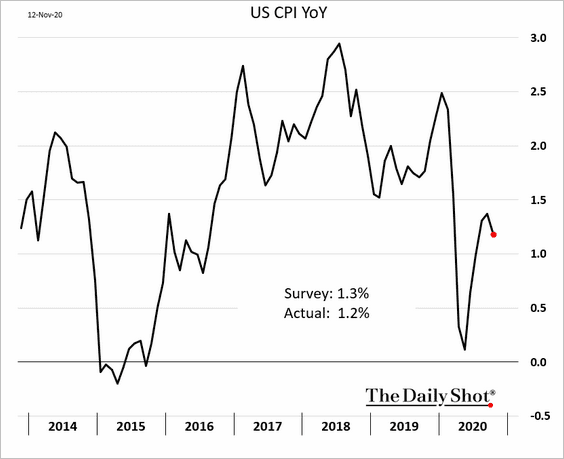
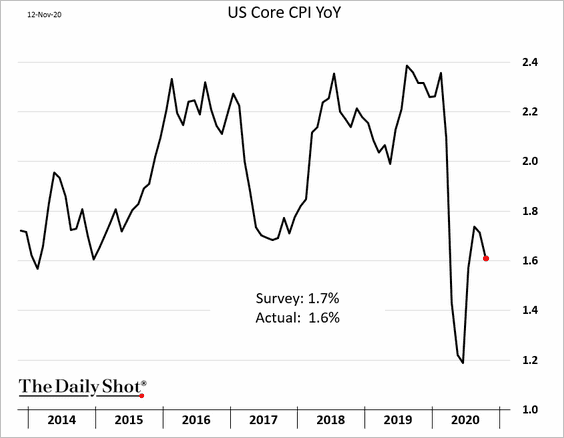
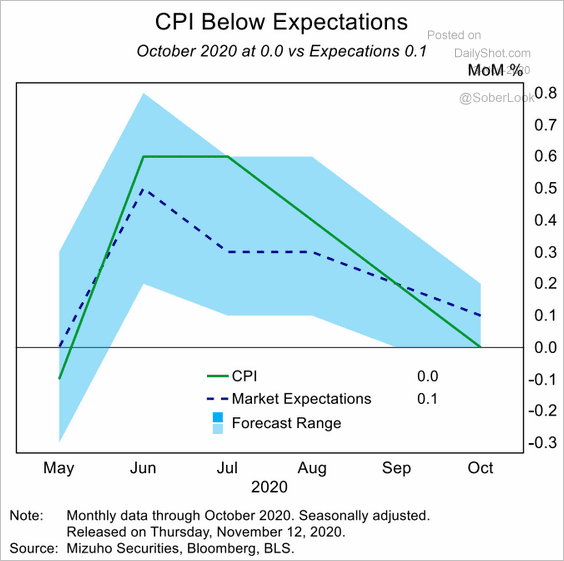 Source: Mizuho Securities USA
Source: Mizuho Securities USA
This chart shows the core services CPI and its components.
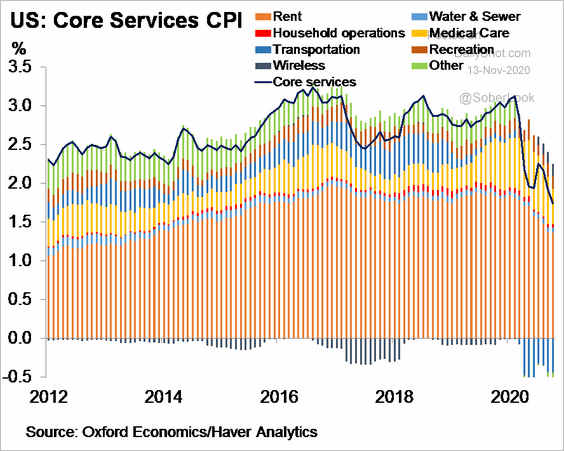 Source: Oxford Economics
Source: Oxford Economics
And these are the month-over-month changes.
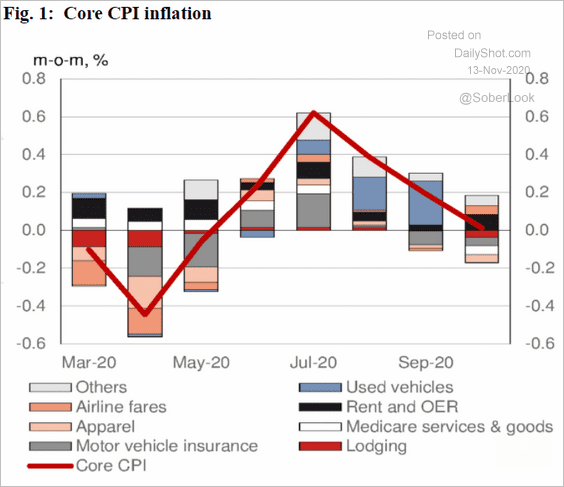 Source: Nomura Securities
Source: Nomura Securities
Over the years, many Americans have become skeptical about the official CPI figures. That mistrust of inflation data became more pronounced this year after the lockdowns. We decided to ask a number of people across the US about their experience with inflation and why they don’t believe the CPI figures. Below are some responses and the corresponding data from the latest CPI report.
– “When I walk into a grocery store, these inflation numbers you report make me laugh.”
– “Have you gone food shopping? It’s hyperinflation out there. ”
While meat inflation (which spiked earlier this year due to supply bottlenecks) is off the highs, prices are still well above last year’s levels.
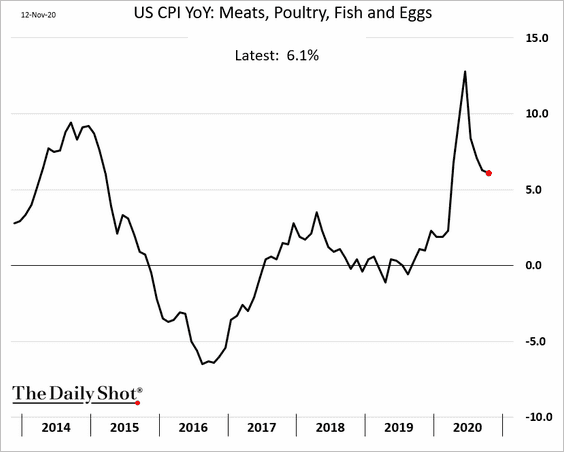
And here we have the CPI for cleaning products.
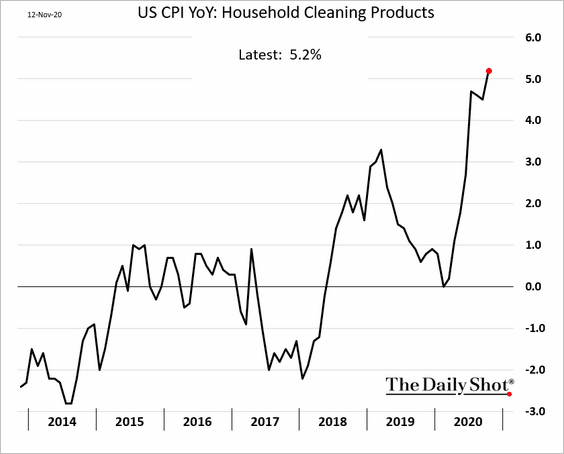
– “I am paying much more these days when I eat out.”
Indeed. Fast-food restaurant prices are up sharply.
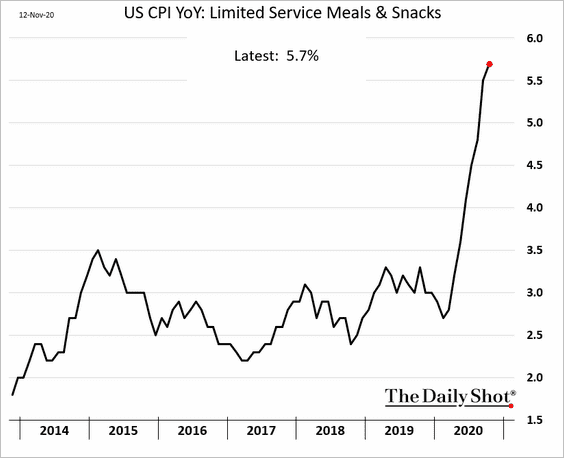
– “It’s costing me way more to get a drink these days.”
Definitely.
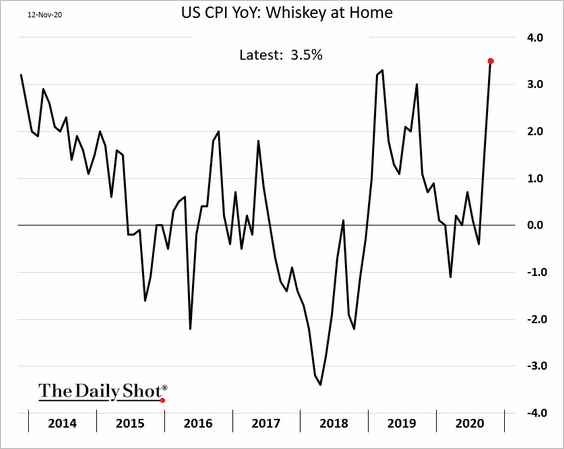
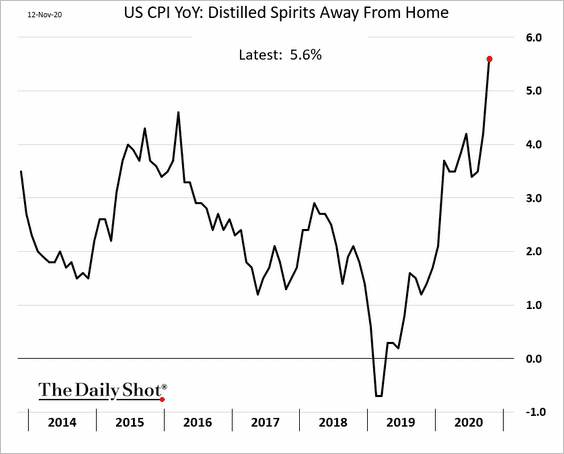
– “I had to pay more for a washer and dryer than the prices I saw last year. It’s a ripoff.”
That’s correct.
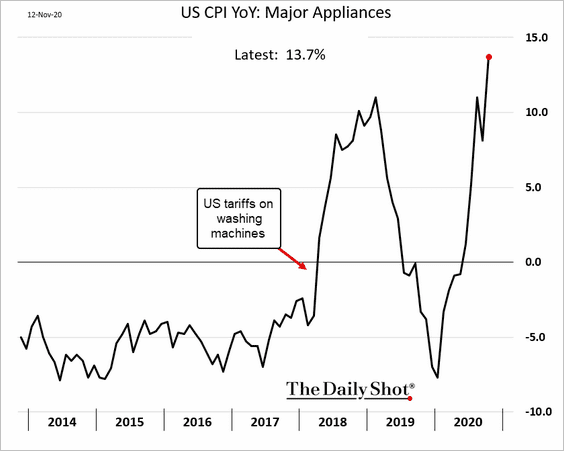
– “Car prices are up. Your inflation numbers are a joke.”
No question about that. Especially used cars.
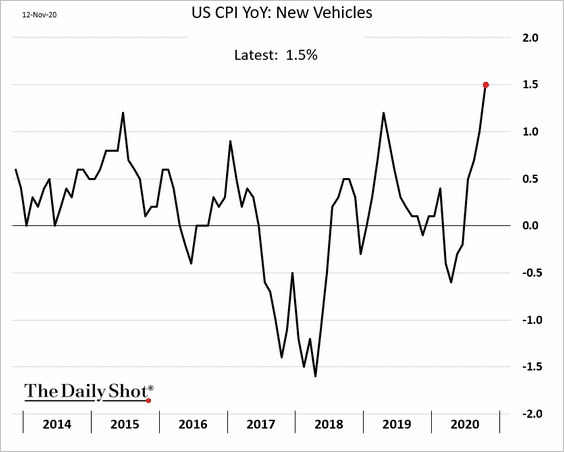
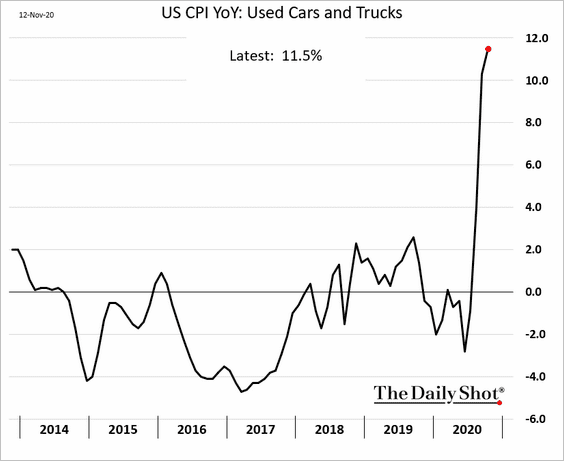
OK, but there are other products and services where prices are rising much slower or even falling. How about technology?
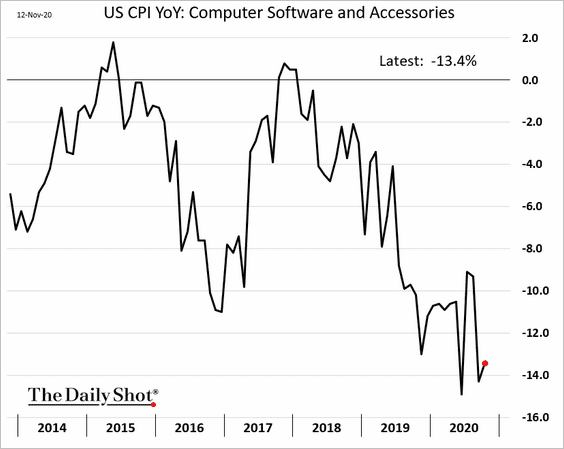
– “I don’t need a new computer – mine works just fine.”
– “I bought a laptop for $1,300. I paid less than that five years ago.”
Yes, but the computer can do much more than it did five years ago.
– “That’s just a bunch of … . A computer with much less capability is just not usable – so you are forced to buy the more powerful stuff.”
Gasoline prices are lower.
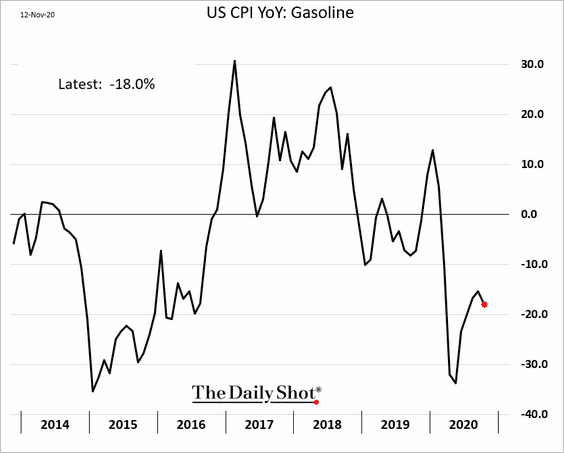
– “Doesn’t matter much – my car does 33 miles/gallon.”
– “I don’t take long trips anymore.”
You can buy men’s suits at a much lower price than last year.
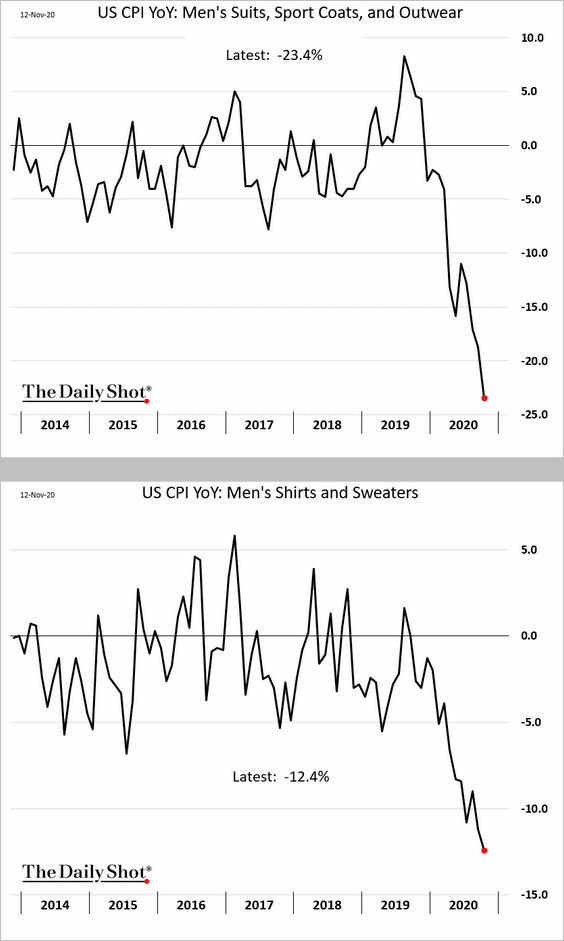
– “I don’t wear suits.”
– “I work from home. I just need a shirt for the video call.”
Healthcare inflation is slowing (3 charts).
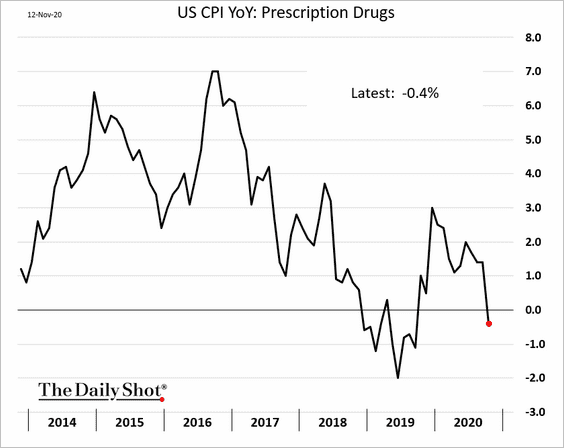
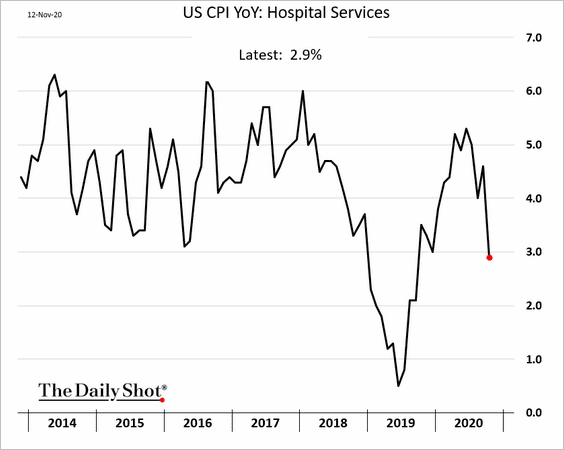
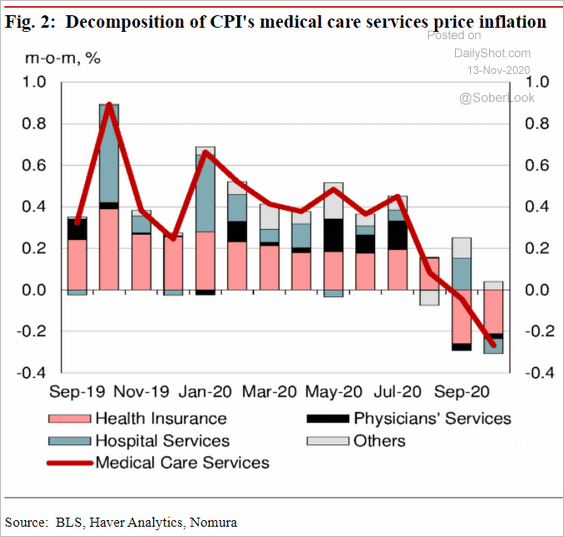 Source: Nomura Securities
Source: Nomura Securities
– “Have you tried going to a doctor out of network?”
– “Yeah, they jacked up prices a couple of years ago – so them not raising prices now doesn’t help.”
– “Doesn’t help me – my insurance pays for it anyway.”
– “Try buying health insurance for your family when you have your own company. It’s $1,400/month.”
Hotels and airline fares are cheaper.
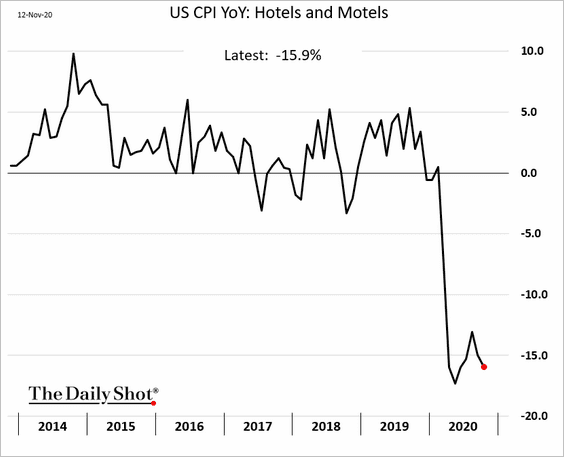
– “There is no way I am staying at a hotel these days.”
– “I have no plans to travel – so how does that help me.”
Movie tickets aren’t rising.
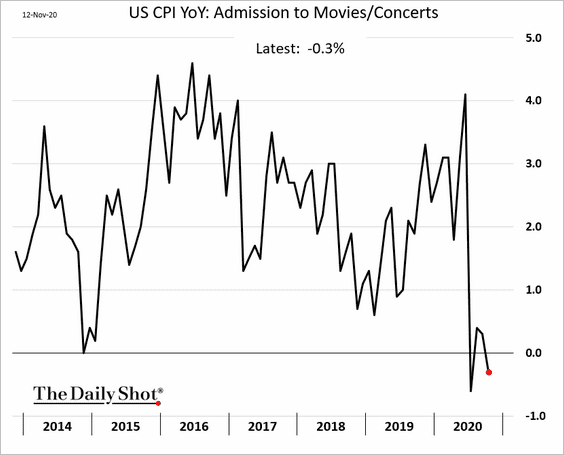
– “Is this a joke?”
– “I am not going until there is a vaccine.”
Pets and pet products are cheaper.
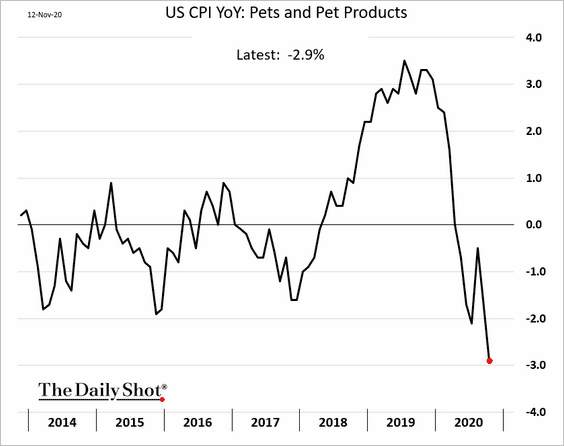
– “Seriously?”
——————–
2. Here are a couple of other updates on inflation.
• Zillow data point to more downside for rent inflation.
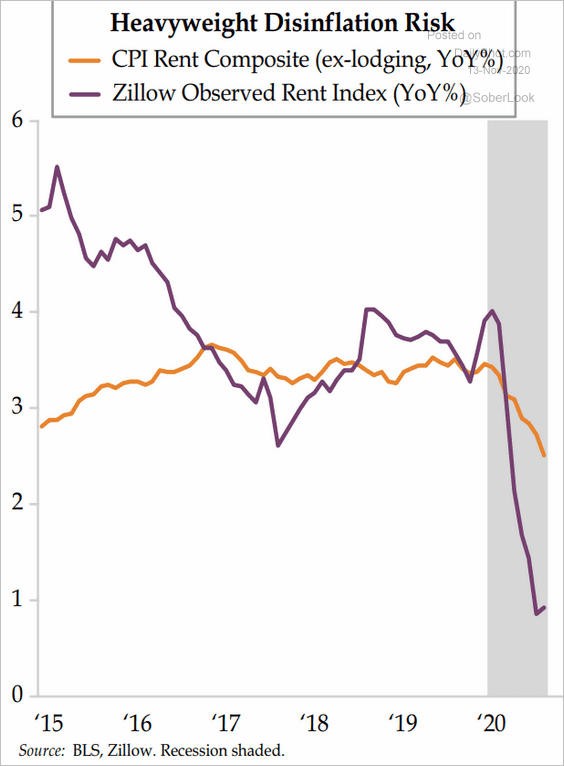 Source: The Daily Feather
Source: The Daily Feather
• Here is another illustration of migration out of large metro areas.
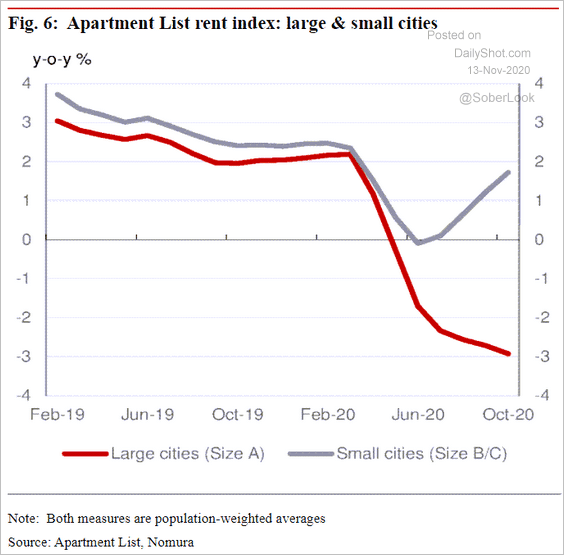 Source: Nomura Securities
Source: Nomura Securities
• Slower population growth tends to correspond to lower inflation.
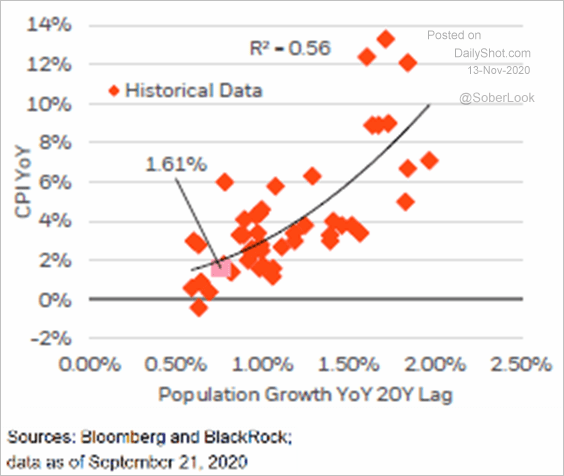 Source: BlackRock
Source: BlackRock
——————–
3. The federal budget started the new fiscal year with a record deficit for the month.
 Source: AP Read full article
Source: AP Read full article
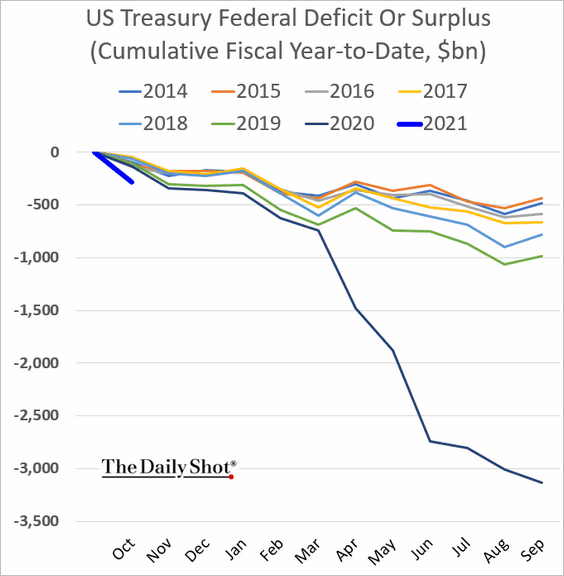
But spending is expected to slow, resulting in a “fiscal cliff.”
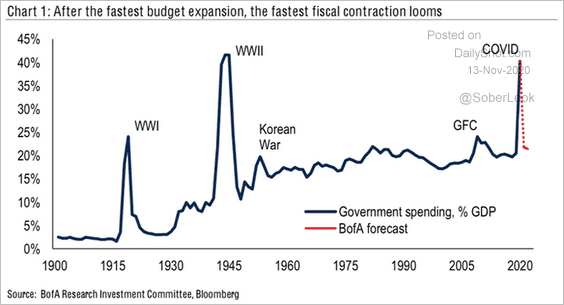 Source: @ISABELNET_SA, @BofAML
Source: @ISABELNET_SA, @BofAML
——————–
4. Initial jobless claims declined last week, but there are risks ahead for the labor market.
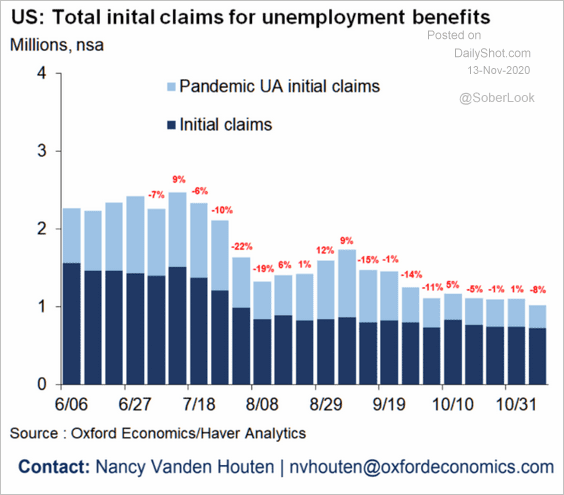 Source: Oxford Economics
Source: Oxford Economics
5. Winter is coming.
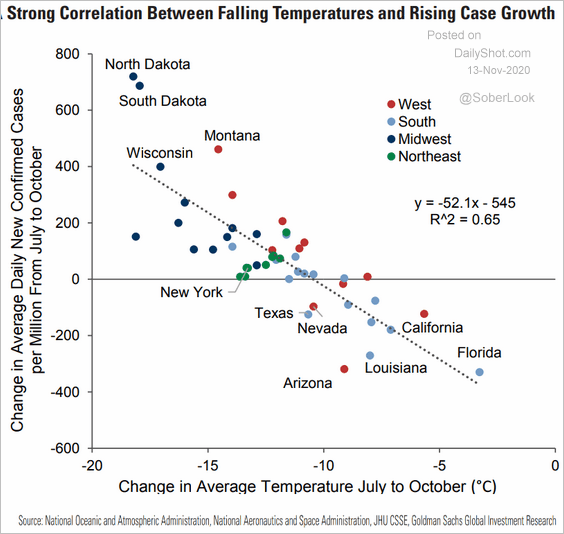 Source: Goldman Sachs
Source: Goldman Sachs
Colder weather means more cases, according to Goldman.
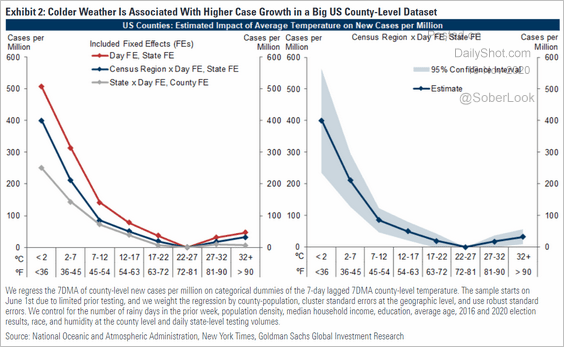 Source: Goldman Sachs
Source: Goldman Sachs
The COVID situation continues to get worse.
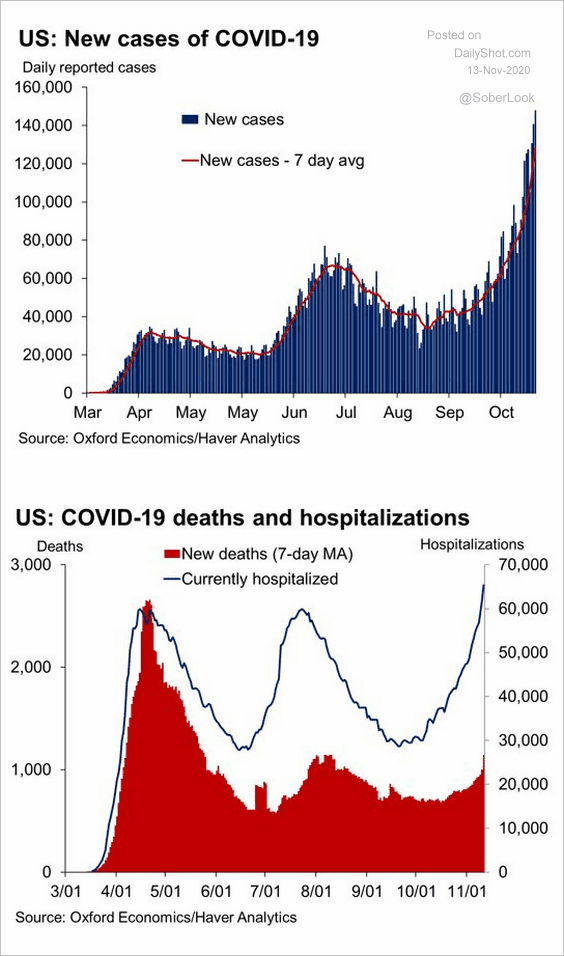 Source: @GregDaco
Source: @GregDaco
——————–
6. The Citi Economic Surprise Index shows some loss of momentum in the recovery.
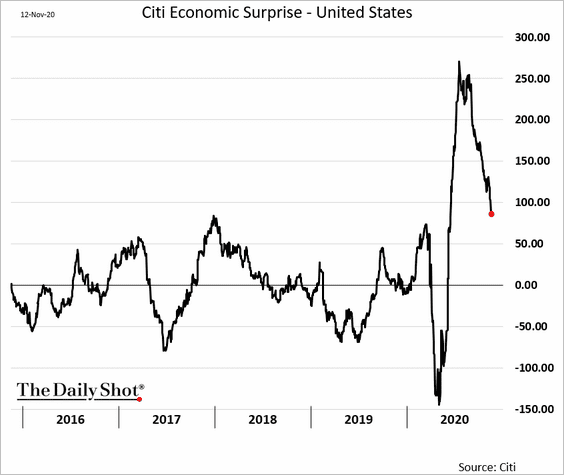
The United Kingdom
1. The Q3 GDP rebound was in line with expectations.
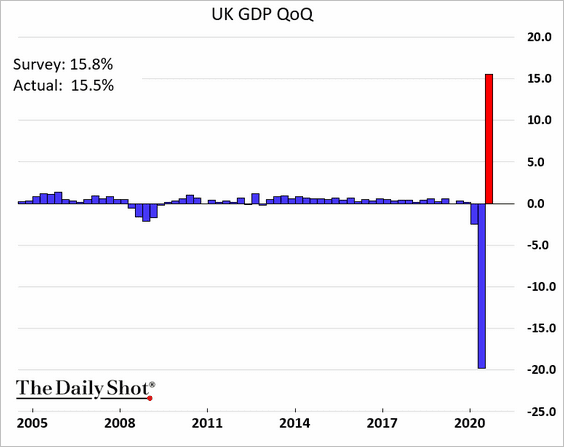
Here is the trajectory vs. previous recessions.
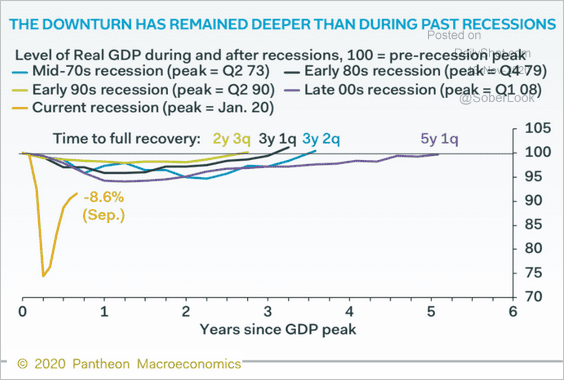 Source: Pantheon Macroeconomics
Source: Pantheon Macroeconomics
Private consumption was relatively strong.
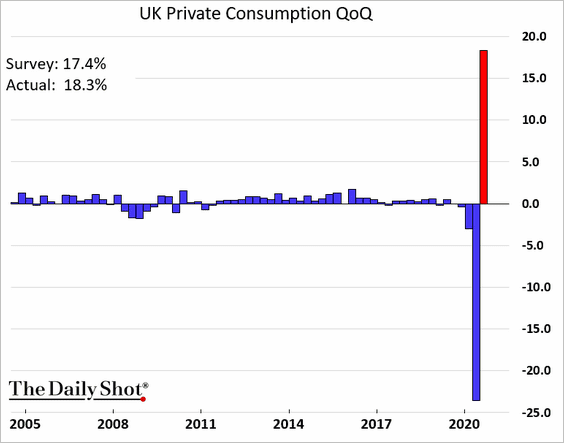
But business investment remains soft.
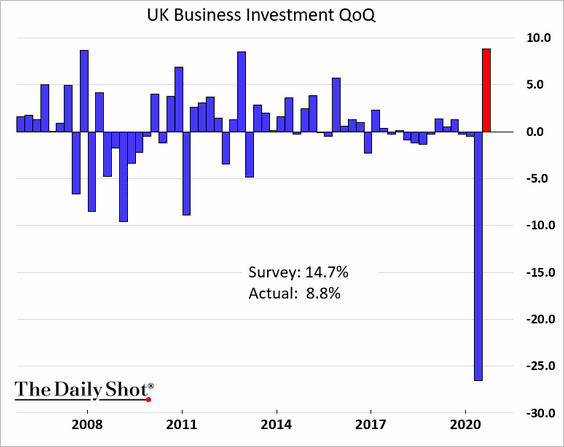
——————–
2. The rebound in factory production is slowing.
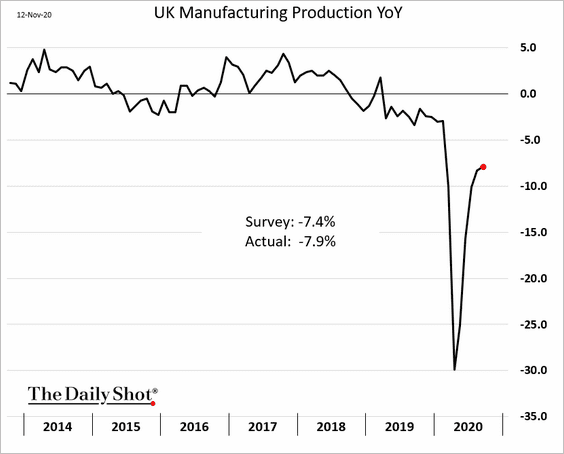
This chart shows the 3-month change in service-sector output.
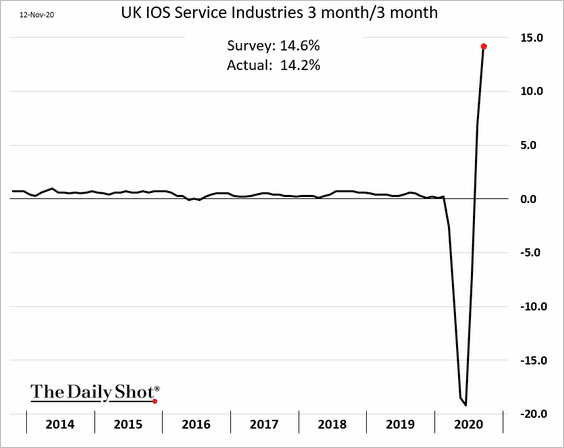
——————–
3. Productivity improved last quarter.
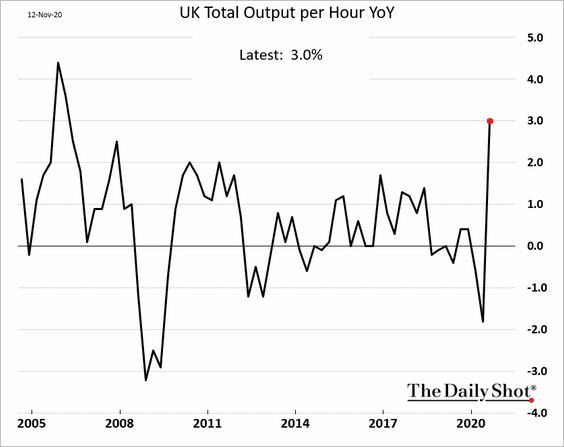
4. The RICS index shows further gains for home prices.
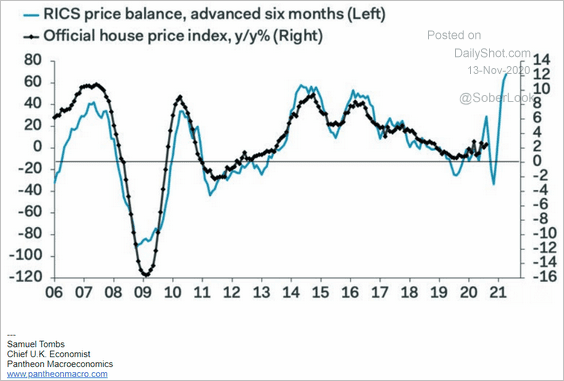 Source: Pantheon Macroeconomics
Source: Pantheon Macroeconomics
While there is an increased demand for detached housing, apartment sales in London have slowed.
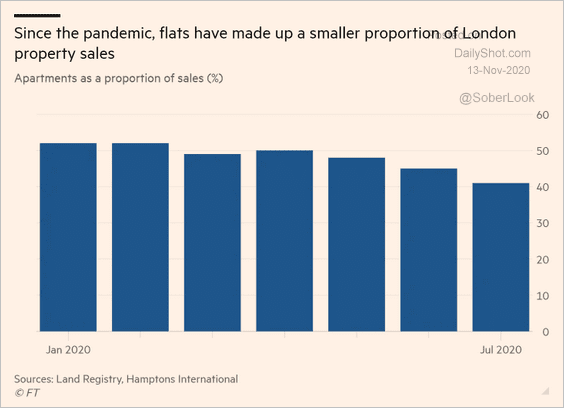 Source: @financialtimes Read full article
Source: @financialtimes Read full article
——————–
5. London office properties look attractive as an investment relative to other major European cities (assuming tenants will return).
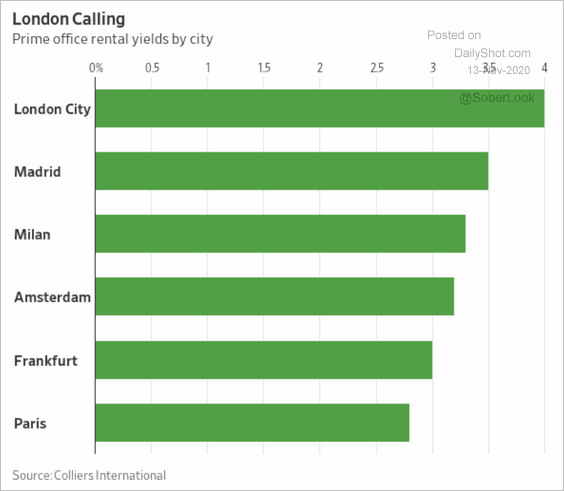 Source: @WSJ Read full article
Source: @WSJ Read full article
6. UK companies have been adding more storage as they try to address the EU deal uncertainty.
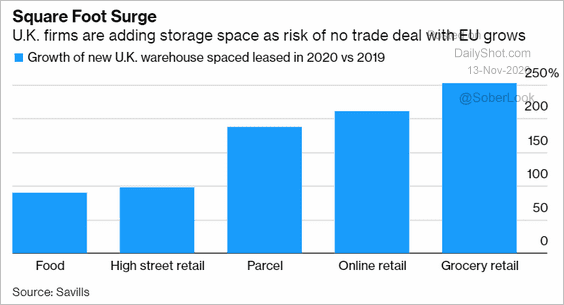 Source: @business Read full article
Source: @business Read full article
7. The euro once again held support relative to the pound.
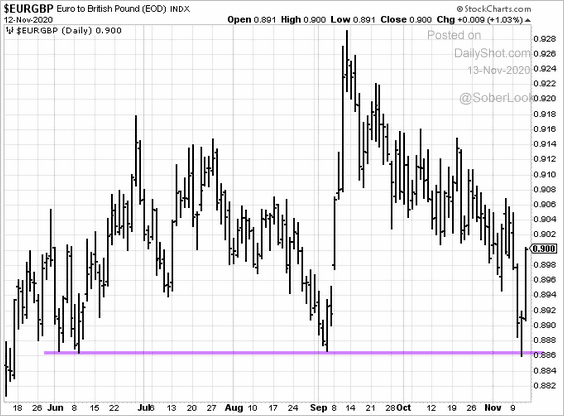 h/t @vkaramanis_fx
h/t @vkaramanis_fx
8. Many disabled adults struggled to access medications and medical supplies during the pandemic.
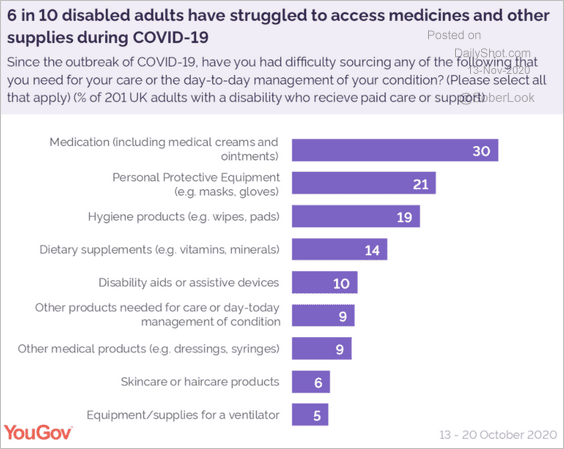 Source: YouGov Read full article
Source: YouGov Read full article
The Eurozone
1. As we saw previously (#3 here), the rebound in industrial production has stalled.
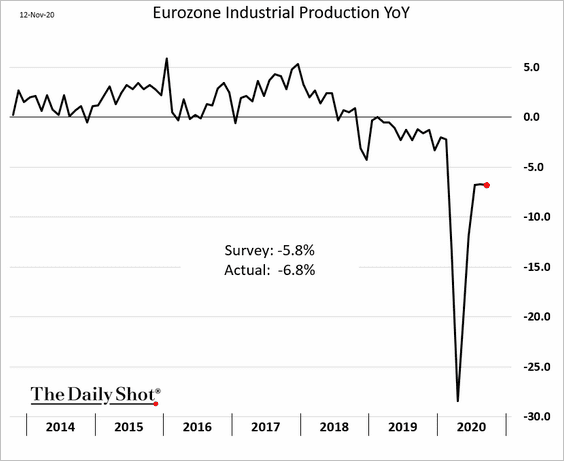
The Eurozone is trailing the overall EU output.
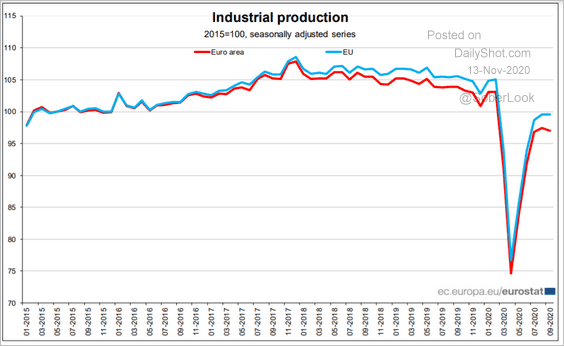 Source: Eurostat Read full article
Source: Eurostat Read full article
——————–
2. Here are some updates on Germany.
• Discretionary items CPI (see comment from Pantheon Macroeconomics):
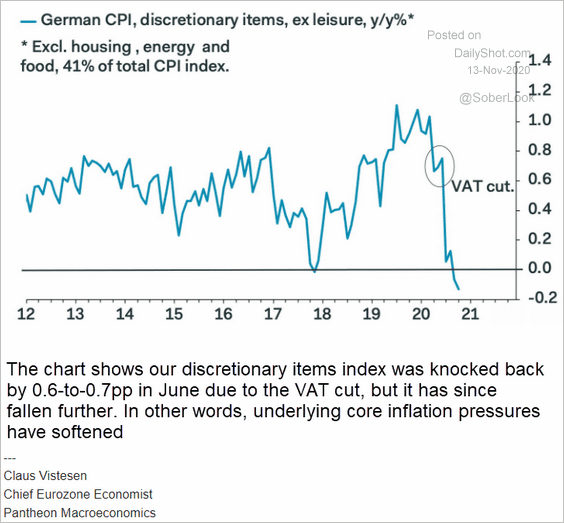 Source: Pantheon Macroeconomics
Source: Pantheon Macroeconomics
• Restaurants open for reservations:
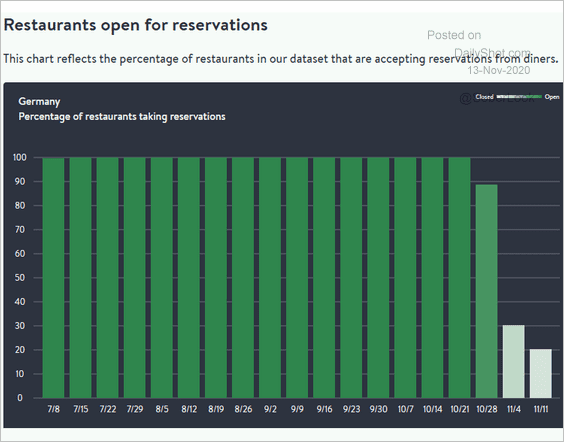 Source: OpenTable
Source: OpenTable
• Fiscal stimulus (Germany vs. China):
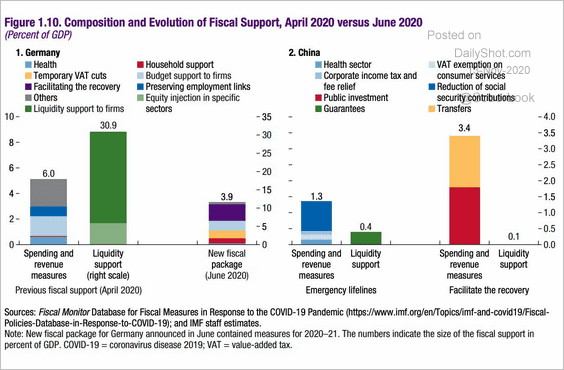 Source: @adam_tooze, @IMFNews
Source: @adam_tooze, @IMFNews
——————–
3. Ireland is deep in deflation.
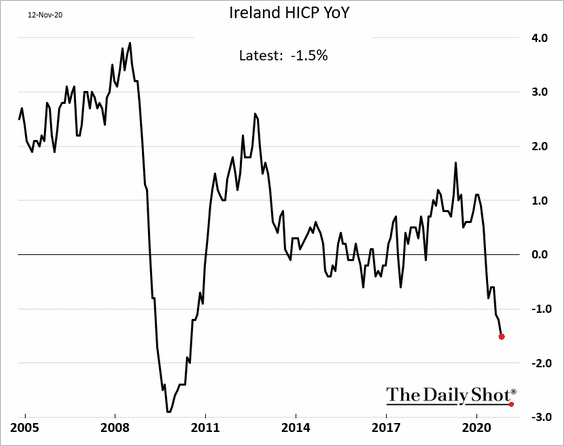
Europe
1. Mobility across Europe has deteriorated.
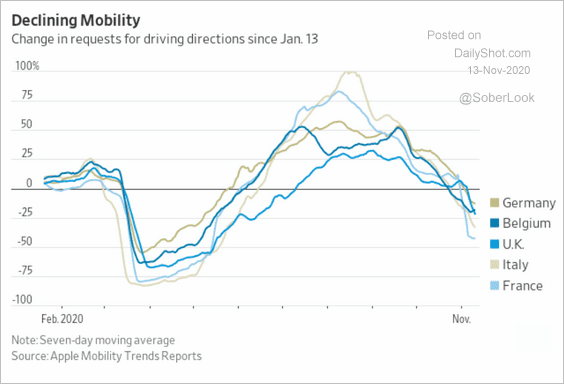 Source: @jeffsparshott
Source: @jeffsparshott
2. This chart shows European death rates vs. historical averages.
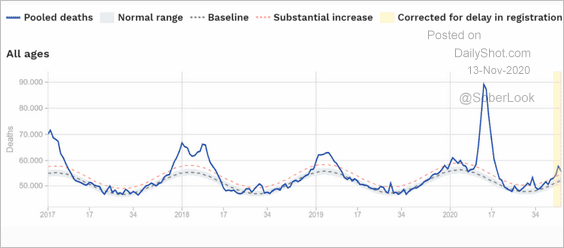 Source: EuroMOMO
Source: EuroMOMO
3. Next, we have some updates on employment.
• Factory workers that are at work:
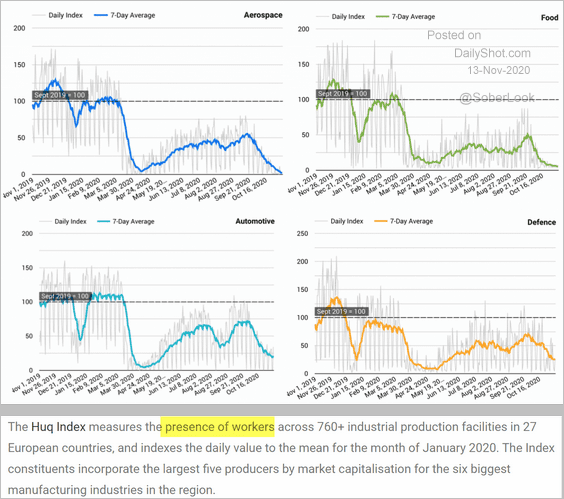 Source: Huq
Source: Huq
• Employment rate changes (Q4 2019 to Q2 2020):
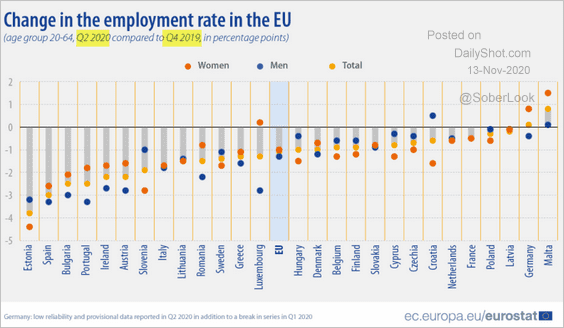 Source: Eurostat Read full article
Source: Eurostat Read full article
• More older Europeans are working:
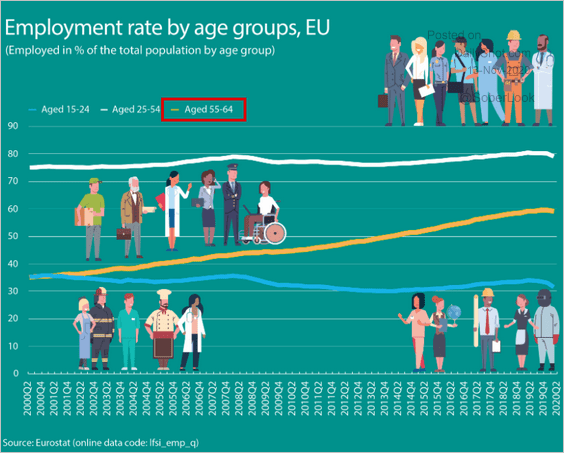 Source: Eurostat Read full article
Source: Eurostat Read full article
Asia – Pacific
1. Foreigners are buying Japanese stocks.
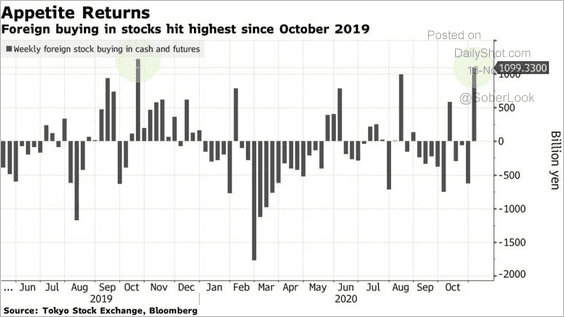 Source: @markets Read full article
Source: @markets Read full article
2. This chart shows car sales in select Asian countries:
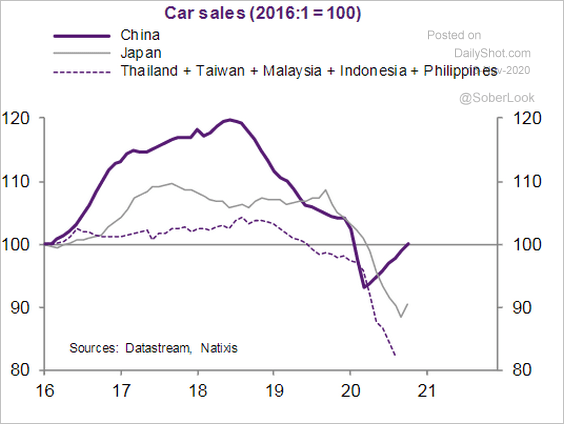 Source: Natixis
Source: Natixis
3. Next, we have some updates on Australia.
• Mobility:
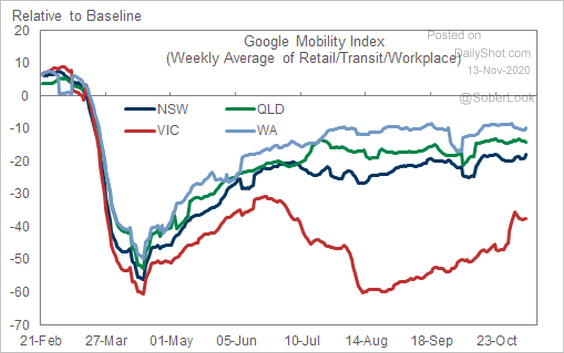 Source: Goldman Sachs
Source: Goldman Sachs
• Infection rates (2 charts):
 Source: @ShaneOliverAMP
Source: @ShaneOliverAMP
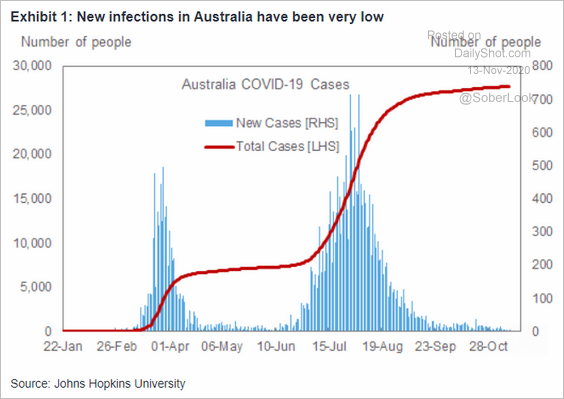 Source: Goldman Sachs
Source: Goldman Sachs
• Business lending:
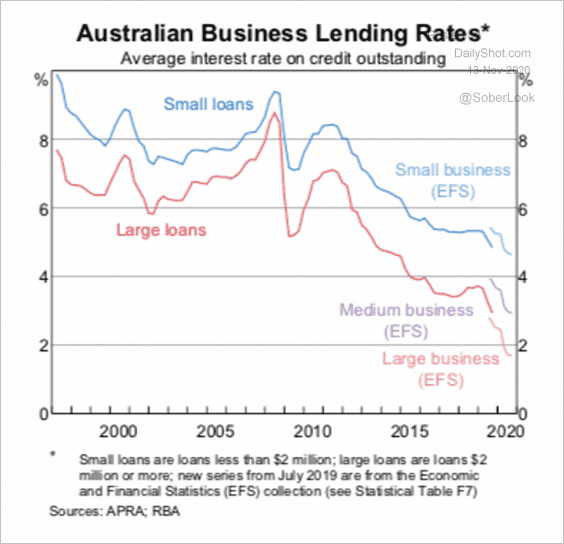 Source: RBA
Source: RBA
• Consumption, disposable income, and the savings ratio:
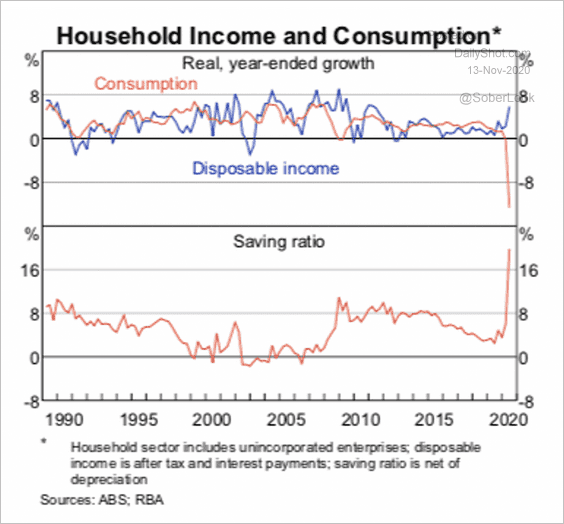 Source: RBA
Source: RBA
• A 20-year high in equity inflows has been mirrored by a 20-year high in debt outflows.
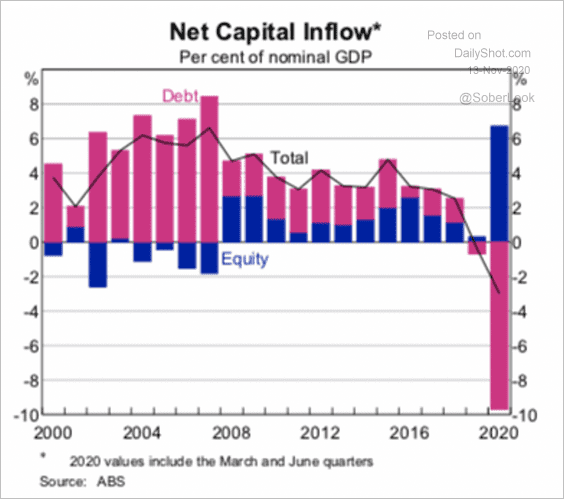 Source: RBA
Source: RBA
China
1. Rates are rising across the board.
• The 10yr and 5yr bond yields:
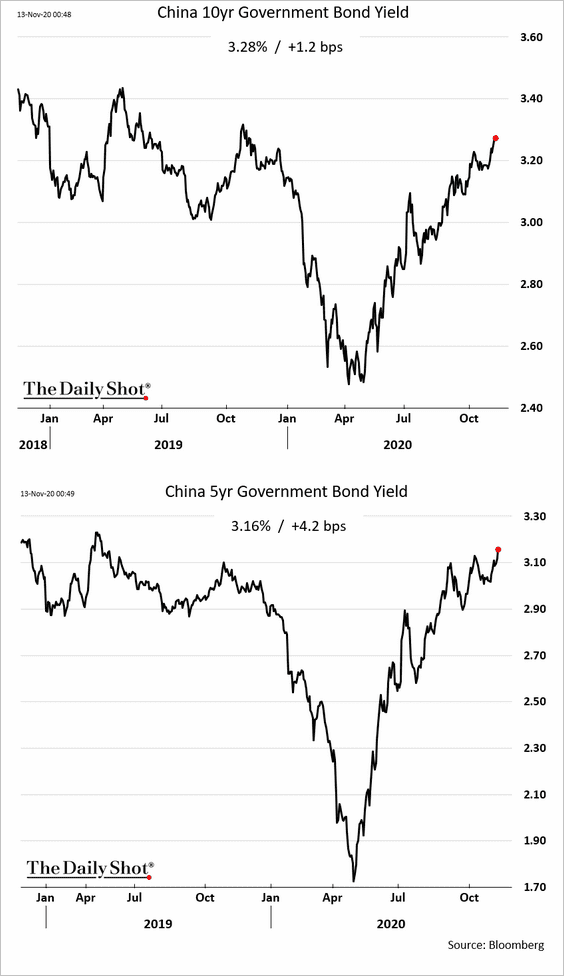
• The 2-year interest rate swap:
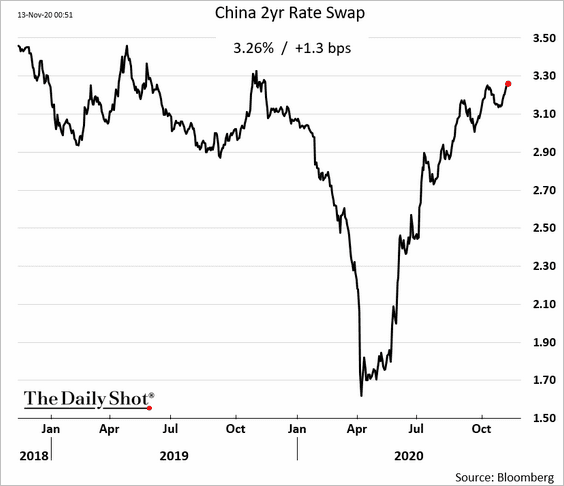
• The 7-day repo rate (points to tight monetary conditions):
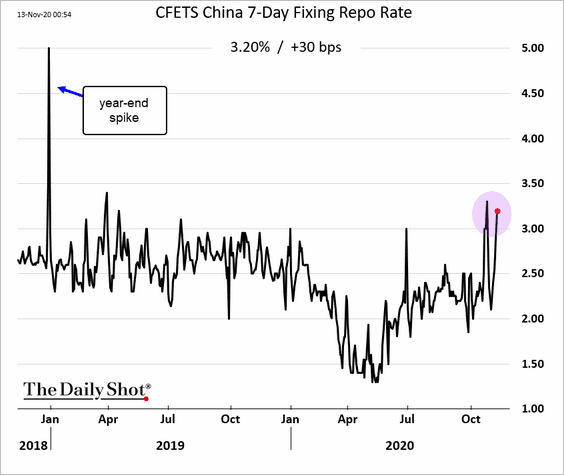
• The 3-month rate implied by the offshore yuan F/X forwards (points to tighter liquidity in the offshore currency):
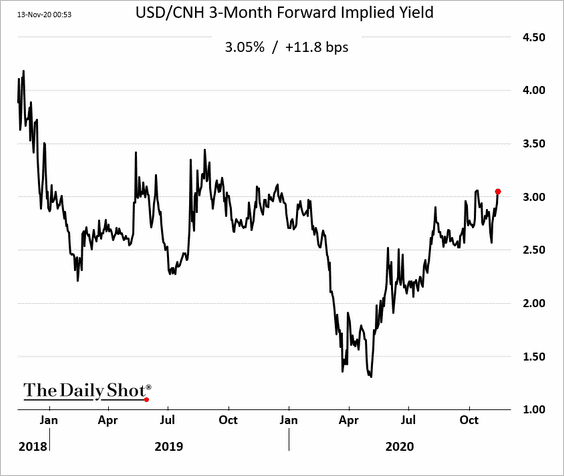
——————–
2. The stock market is back within the recent trading range.
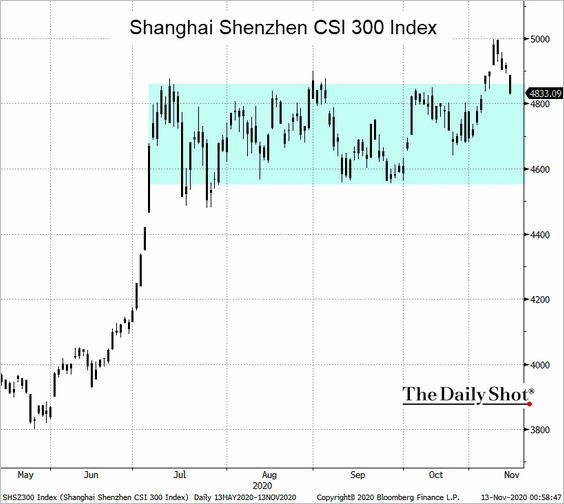 Source: @TheTerminal, Bloomberg Finance L.P.
Source: @TheTerminal, Bloomberg Finance L.P.
2. Foreign ownership of bonds hit a record high.
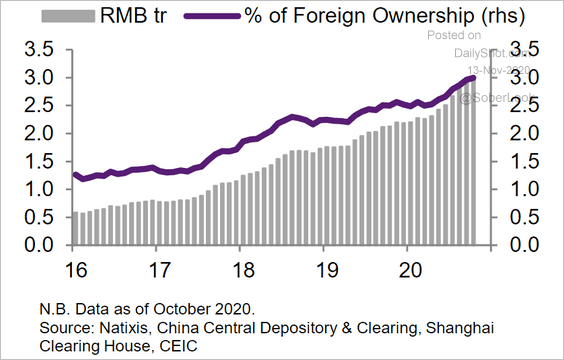 Source: Natixis
Source: Natixis
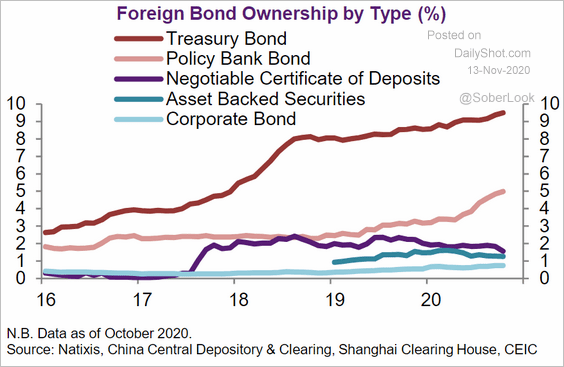 Source: Natixis
Source: Natixis
3. Steel demand keeps climbing.
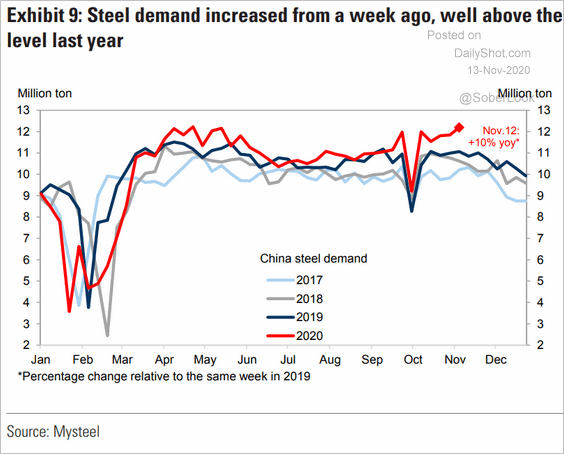 Source: Goldman Sachs
Source: Goldman Sachs
4. Online retail market share increased sharply during the pandemic.
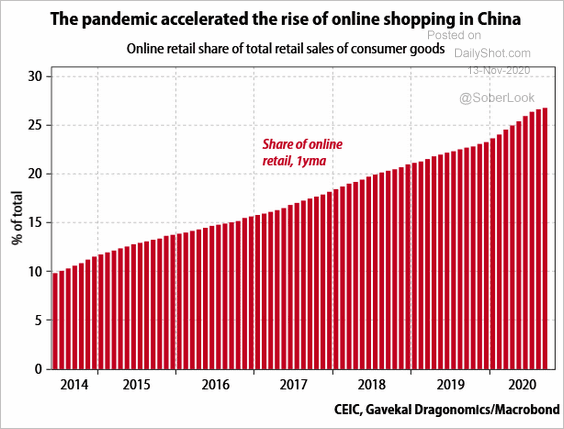 Source: Gavekal
Source: Gavekal
Emerging Markets
1. India’s CPI surprised to the upside, driven by food prices.
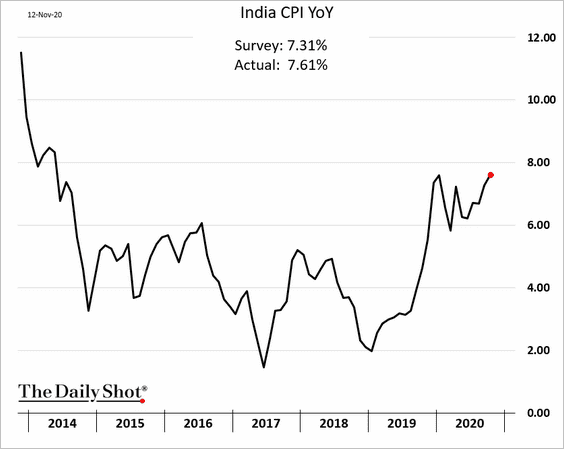
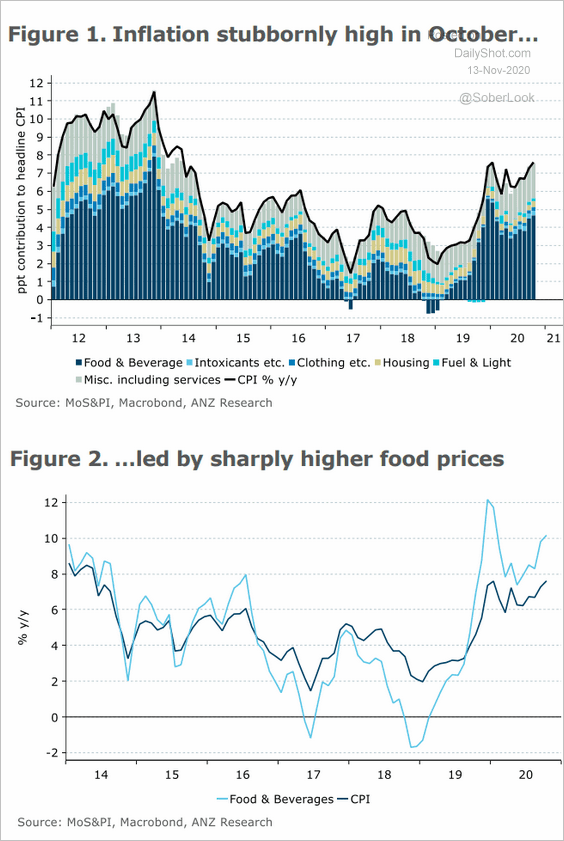 Source: ANZ Research
Source: ANZ Research
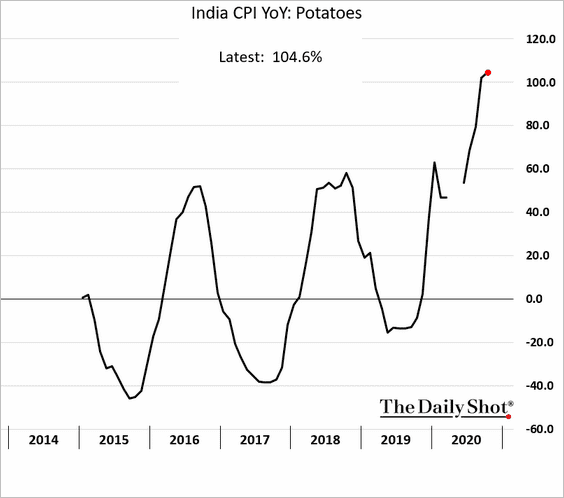
——————–
2. Russia’s GDP bounced from the lows, but the recovery will take time.
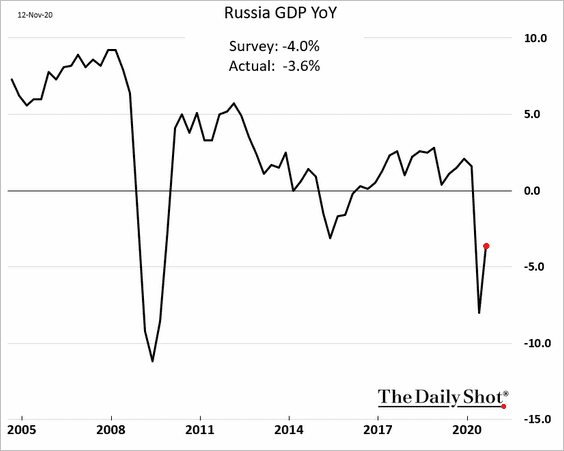
3. Turkish assets continue to climb in response to Erdogan’s supposed policy shift.
• The lira:
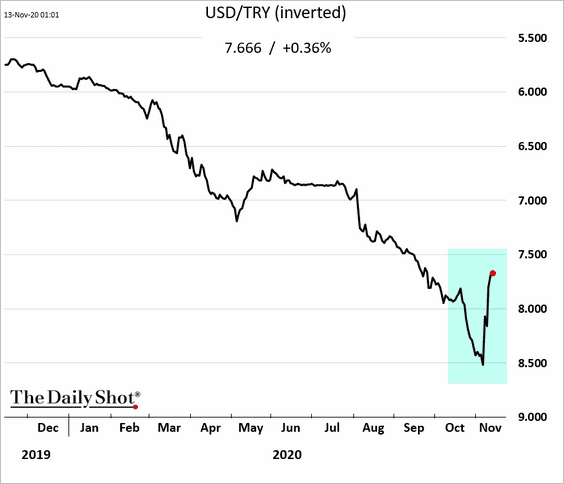
• The 10yr USD-denominated bond yield:
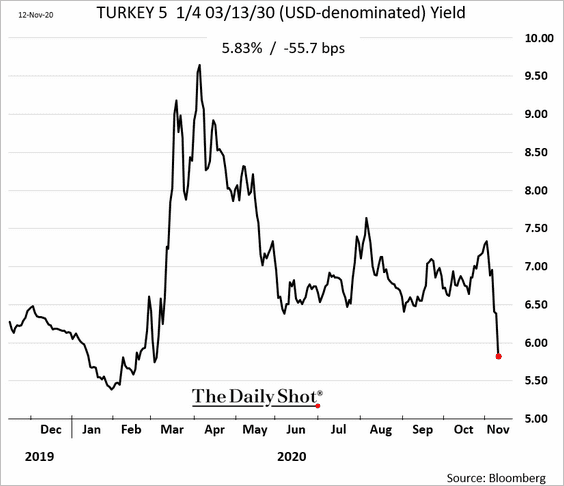
——————–
4. Here are a couple of updates on South Africa:
• Mining output:
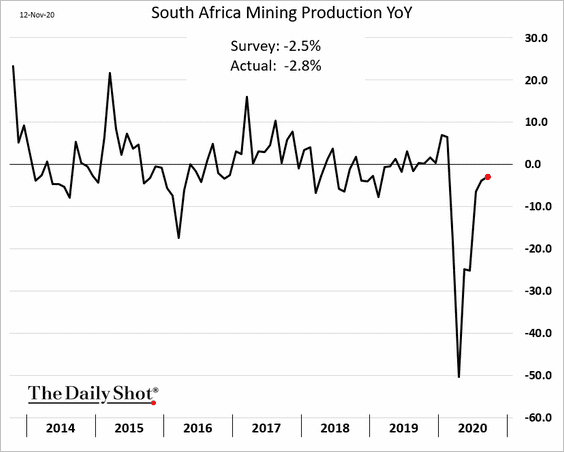
• The quarterly unemployment rate:
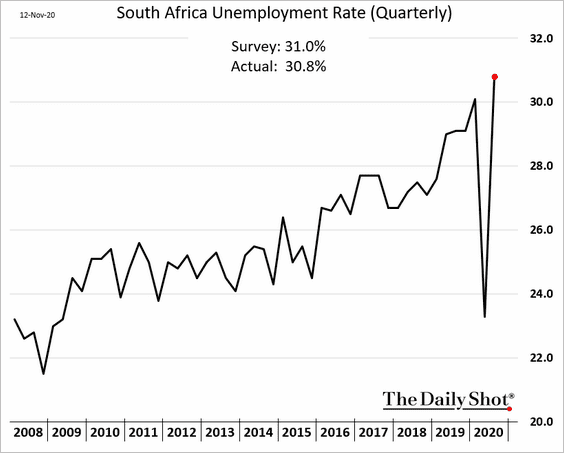
——————–
5. Egypt’s central bank cut rates again. The big rate spike in 2016 was after the nation’s massive currency devaluation.
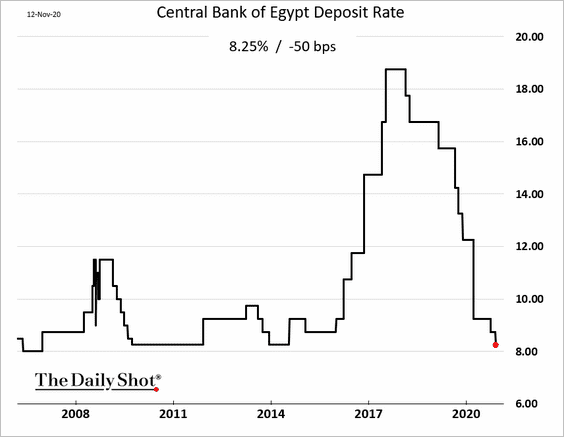
6. Banxico kept rates on hold due to inflation concerns. The market was hoping for a cut.
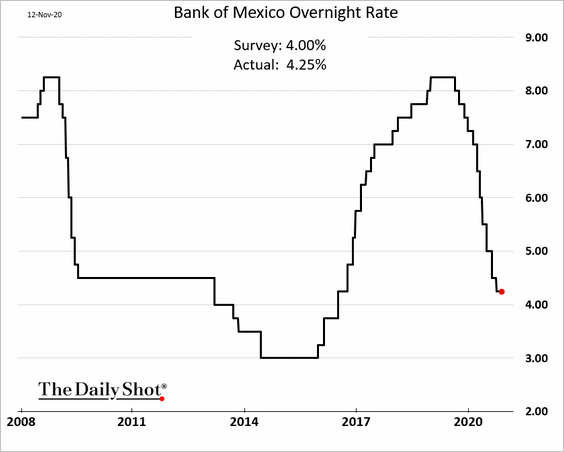
Cryptocurrency
Bitcoin blasted past $16k for the first time since early 2018.
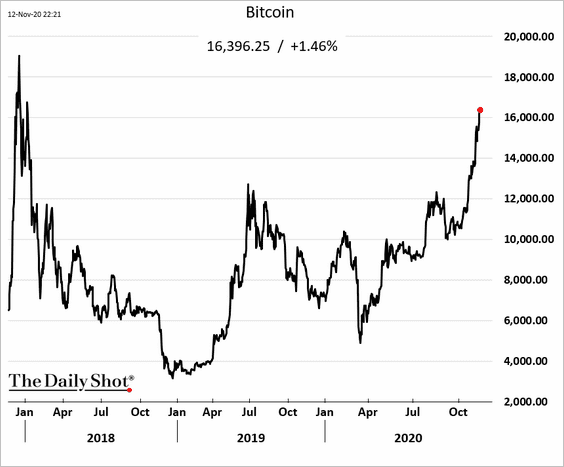
Energy
1. Crude oil remains stuck in a trading range.
• WTI:
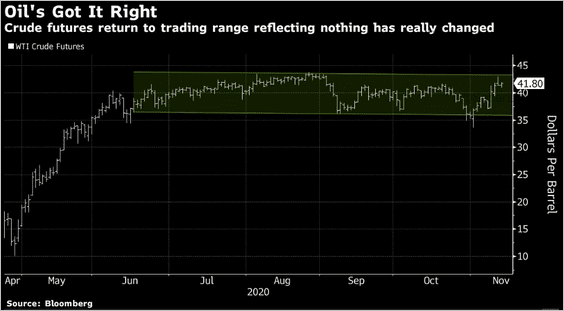 Source: @KritiGuptaNews
Source: @KritiGuptaNews
• Brent:
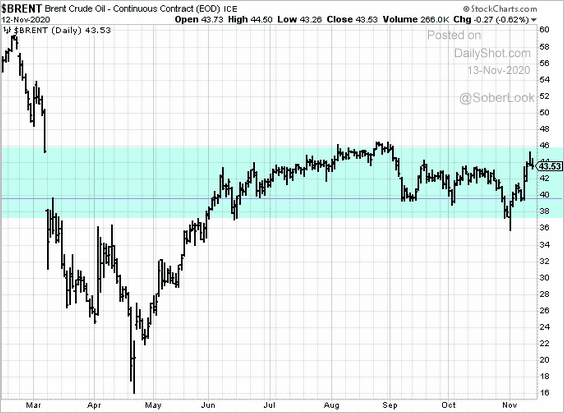
——————–
2. This chart shows net US oil imports:
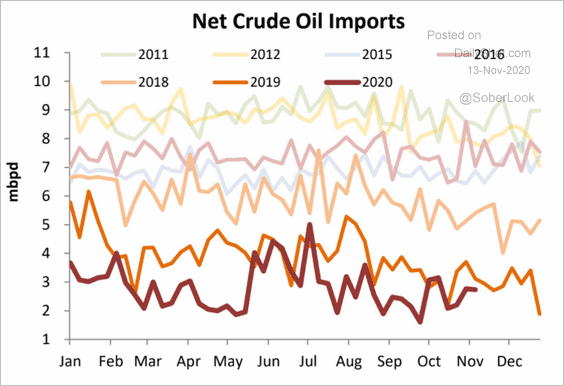 Source: Princeton Energy Advisors
Source: Princeton Energy Advisors
3. The EIA’s (US Department of Energy) continues to downgrade its global petroleum liquids consumption forecasts.
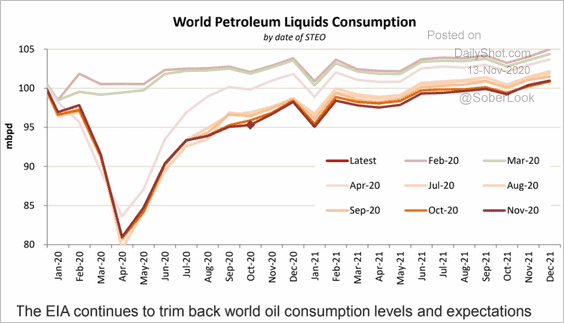 Source: Princeton Energy Advisors
Source: Princeton Energy Advisors
Equities
1. The S&P 500 is at long-term resistance.
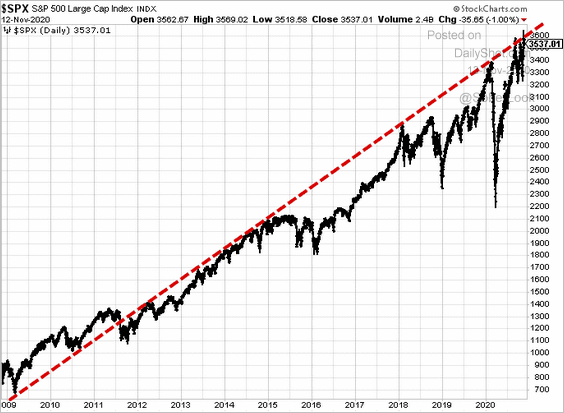 h/t Cormac Mullen
h/t Cormac Mullen
2. Companies known for share buybacks and dividend payouts (total cash return) have outperformed those focused on CapEx and R&D.
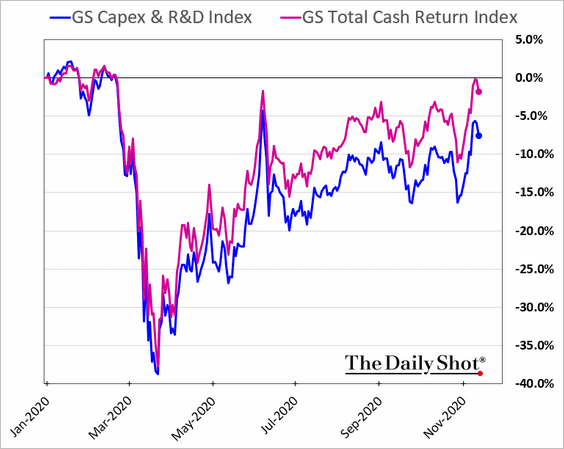
3. Year-over-year earnings growth is expected to turn positive next year.
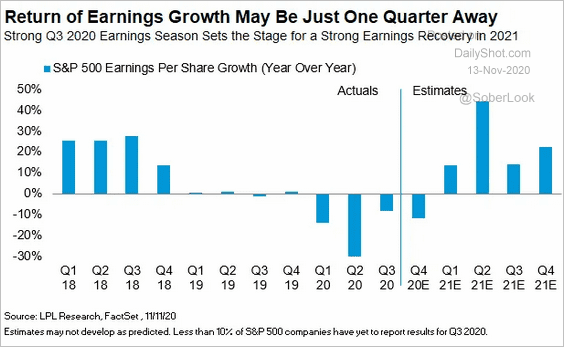 Source: LPL Research
Source: LPL Research
4. US stocks are expensive relative to the rest of the world.
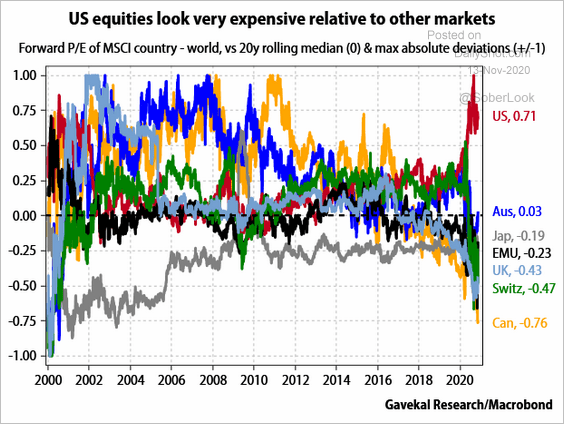 Source: Gavekal
Source: Gavekal
6. Stock funds saw massive inflows this week.
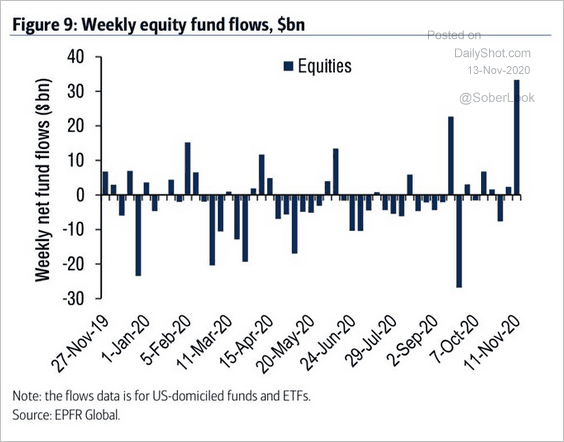 Source: BofA, @WallStJesus
Source: BofA, @WallStJesus
7. US investors haven’t been this bullish since early 2018 (right after the US tax cuts).
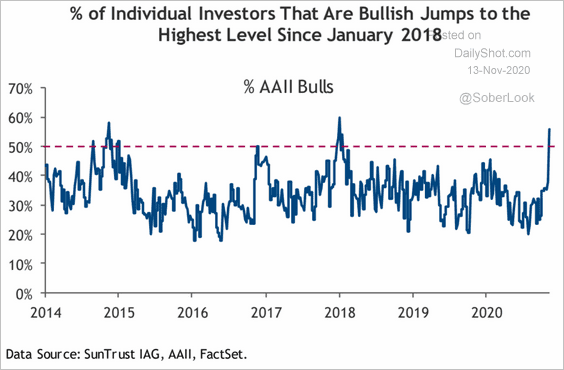 Source: SunTrust Private Wealth Management
Source: SunTrust Private Wealth Management
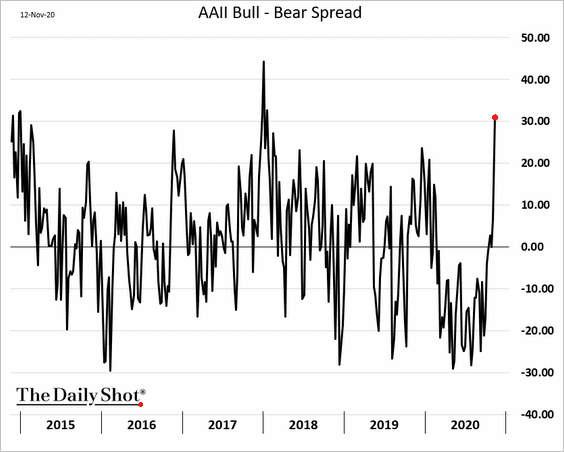
——————–
8. Higher yields are no longer coinciding with lower equity volatility.
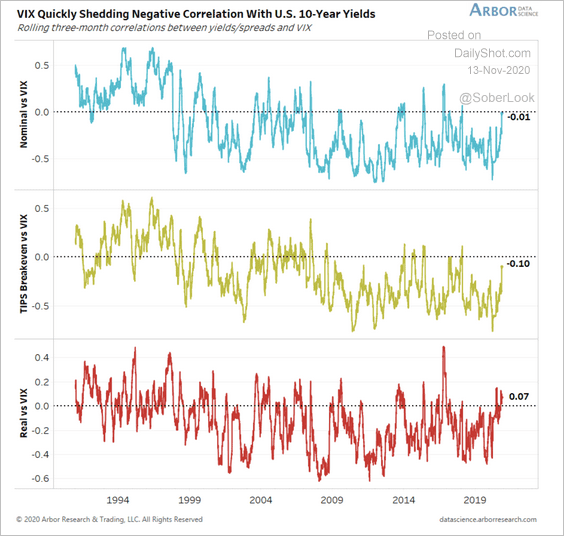 Source: Arbor Research & Trading
Source: Arbor Research & Trading
——————–
Food for Thought
1. Urban population growth:
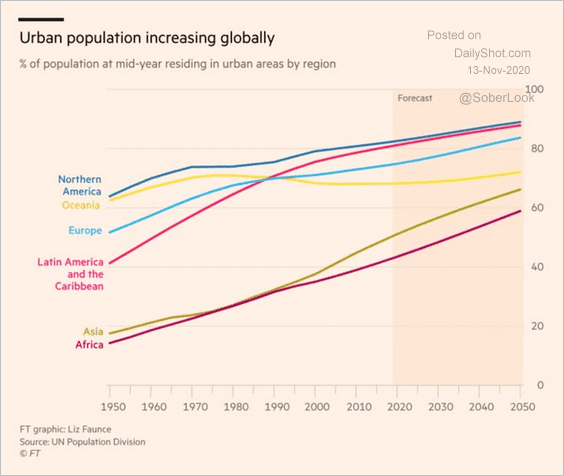 Source: @adam_tooze Read full article
Source: @adam_tooze Read full article
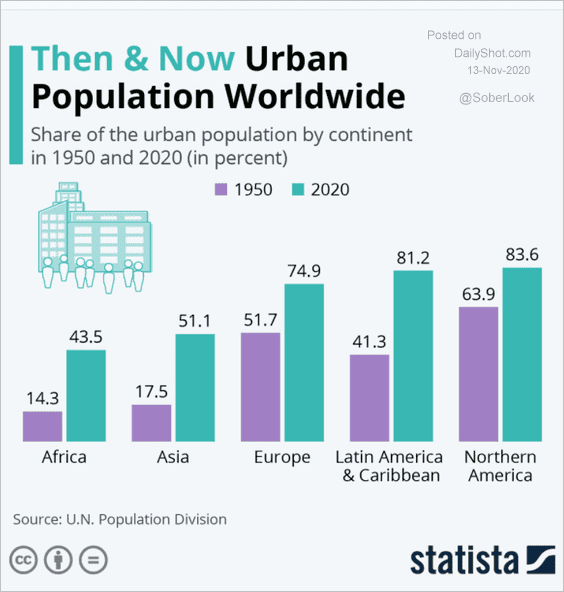 Source: Statista
Source: Statista
——————–
2. The history of US bank mergers:
 Source: Martineau, Knox, Combs; American Journal of Industrial and Business Management
Source: Martineau, Knox, Combs; American Journal of Industrial and Business Management
3. Veteran-owned small businesses:
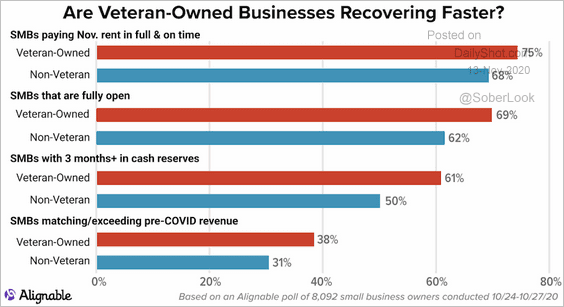 Source: Alignable Read full article
Source: Alignable Read full article
4. How much refrigeration does Pfizer’s vaccine require?
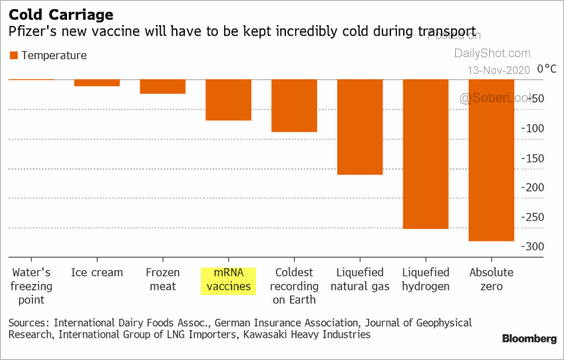 Source: @danmurtaugh, @TheTerminal, Bloomberg Finance L.P.
Source: @danmurtaugh, @TheTerminal, Bloomberg Finance L.P.
5. Path to citizenship for illegal immigrants:
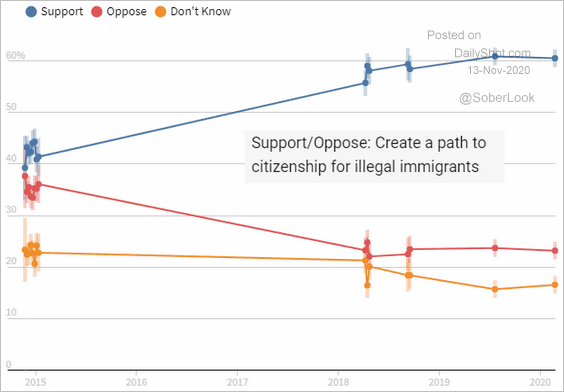 Source: Reuters Read full article
Source: Reuters Read full article
6. DNA-based exonerations:
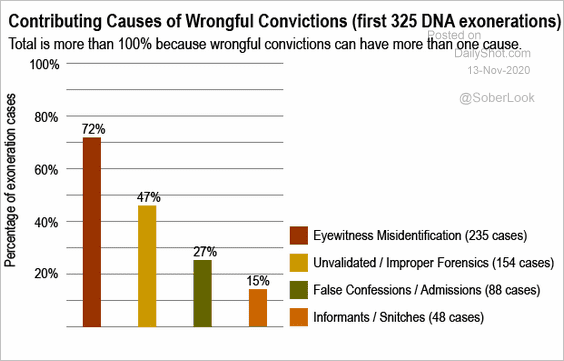 Source: Innocence Project Read full article
Source: Innocence Project Read full article
7. US political polarization:
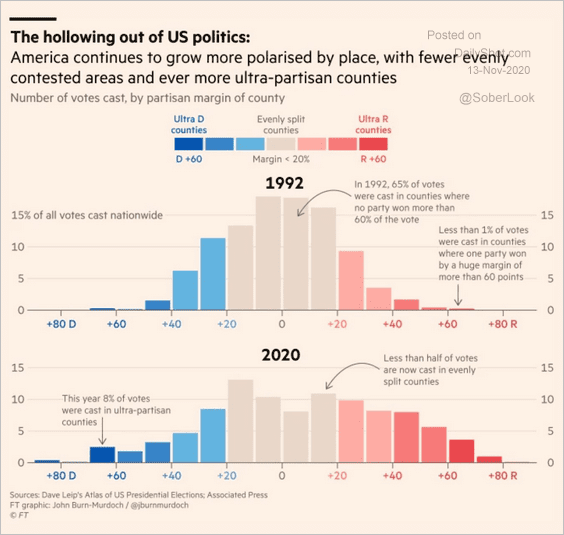 Source: @adam_tooze, @financialtimes Read full article
Source: @adam_tooze, @financialtimes Read full article
8. US presidents with Irish ancestry:
 Source: @onlmaps Read full article
Source: @onlmaps Read full article
9. Diwali – India’s festival of lights:
 Source: Tripsavvy Read full article
Source: Tripsavvy Read full article
10. Favorite drinks in the US:
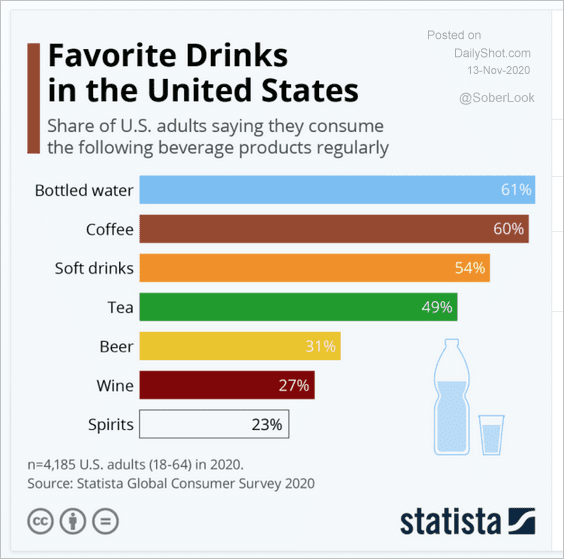 Source: Statista
Source: Statista
——————–
Have a great weekend!
